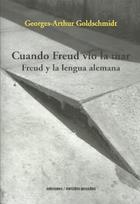
When Freud saw the sea, published in French in 1988, it is the testimony of a voyage or, rather, of a swing, a movement of coming and going, that, instead of settling in one of the languages through which it transits - dwell in it, as some would say - is held in suspense, pending, freely floating, freischwebend.
When Freud saw the sea, he examines the scene of the discovery of the unconscious, which rather than correspond to a single instant, which can be cut and isolated clearly in the history of thought, is a mixture of autobiography, theoretical novel, poetic essay, and philological inquiry. an overdetermined, tangled scene, whose decipherment is a challenge and a perennial task. The German language, its particular configuration and dynamics, its rules and combinations, on the one hand, and Freud's relation to it, a relationship at the same time erudite and loving, on the ...read more











